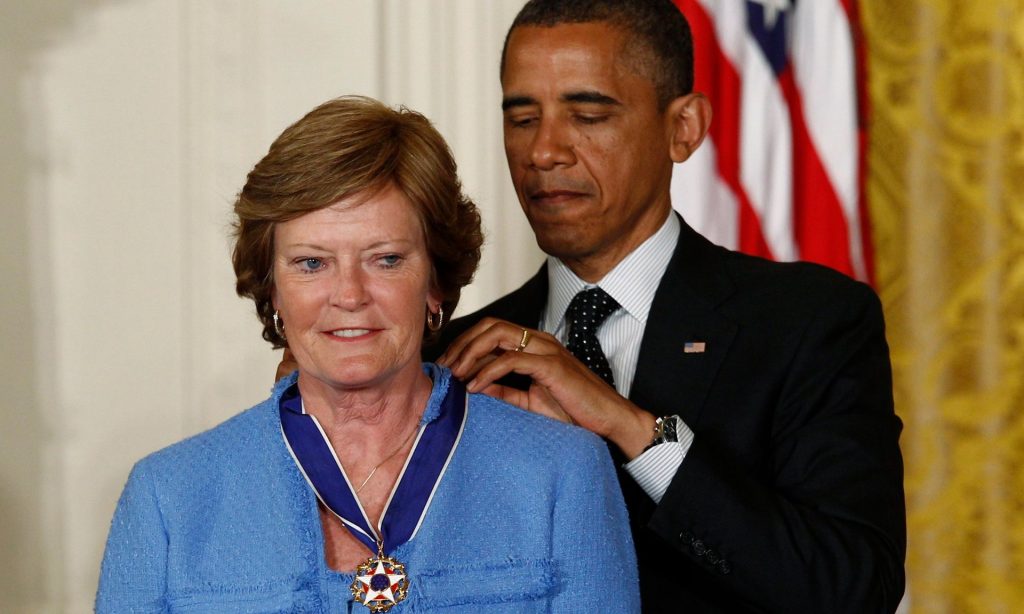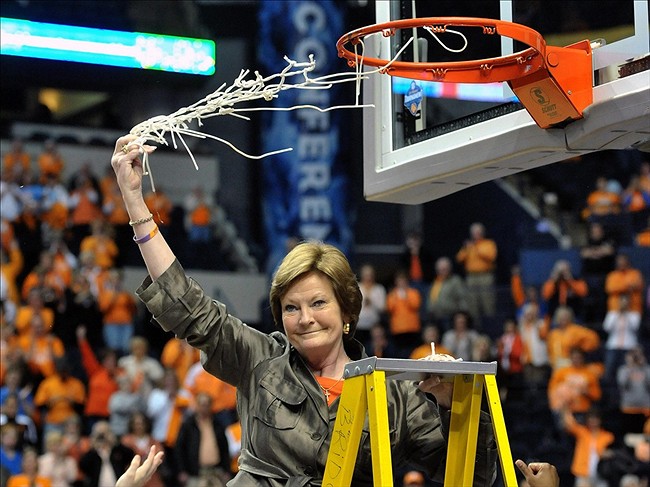
Photograph: Kevin Lamarque/Reuters
Pat Summitt was 22 years old, a kid just out of college, when the University of Tennessee made her their women’s basketball coach. Looking back, it was as if the sport had been waiting for her to come along.
Just two years before, in the spring of 1972, Congress had passed Title IX, an amendment designed to prohibit discrimination on the basis of gender but one that became a mandate for women’s sports at American colleges. As schools scrambled to add female sports, Summitt, known then as Pat Head, was the ideal face for a new athletic crusade.
Her Tennessee teams were tough. They played hard. They won. A ticket to a Tennessee women’s game became as popular as that for a men’s. She forced women’s basketball into a sports world that didn’t want it. She made people pay attention. She took a fringe game and made it big.
Maybe without Summitt, who died on Tuesday five years after being diagnosed with early-onset Alzheimer’s, women’s basketball would have risen. Maybe the Tennessee Vols and their eight NCAA titles and the WNBA and US dominance in the Olympics would have happened even had she not come along. But it’s hard to imagine women’s basketball climbing to the heights it has without the titan she built in Knoxville.
Who would have had the iron resolve to push her players as hard as she did? Who would have challenged players to believe they could challenge every limit; running faster, jumping higher and driving the ball down the court? Maybe somebody would have come along to take women’s basketball into the mainstream, but that person isn’t obvious. Every movement has a leader. For women’s basketball that leader was Summitt.
Advertisement
In the days before she died, as news spread that her health was deteriorating fast, Connecticut coach Geno Auriemma – the Summitt of today – told the Associated Press that she was the driver of his success. “She was the one that everyone tried to emulate,” he said. “That was the program everyone tried to be.”
When Auriemma took over a losing UConn women’s team in 1985 and set out to build a champion, his target was Summitt. He told the AP a defining moment in his program’s rise was when she agreed to bring her No1-ranked Vols to UConn in 1995. Doing so gave his Huskies, who would win their first national title that year, legitimacy. Nobody else, he said, would have taken the risk of such a game. But that was Summitt. Her teams would play anyone, anywhere. That’s how teams become great.
She probably did not enjoy her wars with Auriemma. Toward the end of her time at Tennessee, there appeared to be friction between her and the UConn coach, but the Tennessee-UConn rivalry was the best thing women’s basketball could have had. It meant the sport could have the same intense rivalries as the men’s game.
Her competitiveness gave rise to other great women’s programs who would become the Vols’ rivals. Stanford, Texas, Baylor, Notre Dame and Maryland have all had huge runs motivated by fierce recruiting battles for young women who suddenly realized there was a future in basketball. Summitt’s legacy is not just the eight gleaming NCAA title trophies in Knoxville, Tennessee but the constant stream of women’s pro and college games on television, the dreams of thousands of girls who can aspire to a basketball career, and a national team that never seems to lose.

The 22-year-old straight out of Tennessee-Martin and into the coach’s office back in 1974 had little more than her own guile and the lessons learned from her hard-working father on his dairy farm, but that was enough to build an empire and shove a sport onto primetime television. Title IX gave women’s sports an opportunity; Summitt was one of those who seized that chance and made it matter.
The hardest part about her death is that it came too soon. She always seemed like she was destined to coach Tennessee into her 70s, pushing Auriemma for a few more championships. It was easy to imagine her leading a post-coaching life like that of John Wooden, the great UCLA coach, who was an essential audience for anyone who aspired to brilliance. Her star was supposed to shine longer than 64 years.
But in her time here she made a game more popular than anyone could have imagined. And few ever get to say that.


